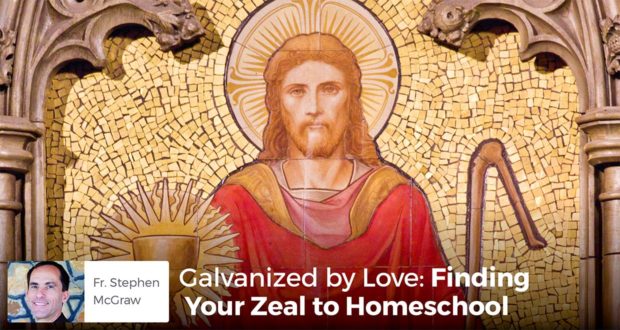Summary
Fr. Stephen McGraw proposes that God wills us to accomplish home-schooling with a zealous and enthusiastic spirit and offers advice when our zeal falters.After an infant Baptism in the Ordinary Form of the Latin Rite, the priest gives a blessing to fathers that includes the following words:
“With their wives they will be the first teachers of their children in the ways of faith. May they be also the best of teachers, bearing witness to the faith by what they say and do, in Christ Jesus our Lord.”
I am prompted by these words to recall the example of my own father, a cradle Catholic from North Dakota (Mom, a California girl, was still a bit “new”, having come into the Church six years or so after their marriage).
Though we had religion class daily at our Catholic school, Dad nonetheless took seriously his role as our first teacher in the ways of faith and would school us each Sunday through the questions and answers of the old Pope St. Pius X Catechism.
Through this means (as well as through the nightly Rosary and a host of other ways), he and his wife handed on the torch of faith to their children in an utterly irreplaceable way.
A Great Commission
This summons to be the first teachers of your child, especially in the Catholic faith, is indeed a great commission, but as every Catholic parent must realize, it is a daunting one! Pope St. John Paul II, in his Apostolic Exhortation Catechesi Tradendae, on Catechesis in our Time, stated, “Every catechist should be able to apply to himself the mysterious words of Jesus: ‘My teaching is not mine, but His who sent me.’”
The Holy Father then comments: “What assiduous study of the word of God transmitted by the Church’s magisterium, what profound familiarity with Christ and with the Father, what a spirit of prayer, what detachment from self must a catechist have in order that he can say, ‘My teaching is not mine!’”
I think, however, that most of you do not need much intellectual convincing as to the greatness of your vocation as parents and teachers of the children entrusted to you.
More likely, the faculty of your soul that requires the most help in this matter is your will, in order to overcome obstacles, perhaps of fear or despondency, that make the task even more arduous than it already is, in and of itself. As St. Josemaria Escriva would say, you have need to “beg for fortitude every day” in the face of this noble mission, this life project to which you have been called.
But something more than gritty determination is necessary if we are not only to do the will of God but, as St. Elizabeth Ann Seton said, “to do it in the manner he wills.”
I propose to you that God wills you to accomplish this great task of home-schooling your children with a zealous and enthusiastic spirit, even though that zeal will inevitably flag at times and the joy in your spirit be reduced to a flicker.
But whence comes this zeal or enthusiasm for the great task that lies before you? One crucial requirement is told to us by St. Teresa of Avila. She expresses her conviction that it is impossible to have enthusiasm for great things unless we come to see how we are favored by God, and how he is constantly replenishing in us the graces that we are losing by our sins.
St. Teresa was convinced that in addition to a lively faith, it was necessary to have a pledge of his love. You must come to an awareness, then, of the truth that you, personally, are favored with His love, and you, personally, must have a pledge of this love that you make our own and hold on to.
A Pledge of His Love
Maybe this pledge of His love comes through the grace of an encounter with Christ, whether this grace comes by way of a particular religious experience or whether it dawns on us through ordinary prayer and reflection.
Maybe it comes through loving converse with Our Lord, whether hanging on a cross that is displayed before our eyes or hidden under the appearance of bread in the Blessed Sacrament (and don’t worry if it feels like just a one-way conversation, that’s normal!). In such moments, we can glimpse the great truth of His favor.
There, He whispers to us what He said to the Apostles: “Blessed are the eyes that see what you see, for I tell you, many prophets and kings longed to see what you see and did not see it!”
We must come then to grasp that, even though God shows no partiality, at the same time, He mysteriously loves us with a love of predilection, with a preferential love, even as a bridegroom loves His bride.
And in grasping how He favors us (yes, sometimes, even especially with crosses!), we can be helped to have enthusiasm for the great things that He is calling us to do for His glory and for the salvation of souls.
[frstephemcgraw]
 Seton Magazine Catholic Homeschool Articles, Advice & Resources
Seton Magazine Catholic Homeschool Articles, Advice & Resources
